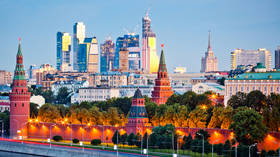Indian business has great prospects in Russia, SPIEF director tells RT

The trade and economic partnership between India and Russia has gone from strength to strength in the wake of Western sanctions on Moscow, the director of the St. Petersburg International Economic Forum (SPIEF) has said.
RT spoke with Aleksey Valkov on the sidelines of the two-day Russia-India Business Forum in New Delhi to find out more about the expanding alliance. According to the official, Russia is a long-standing and proven partner to India, and last year became one of New Delhi’s top five trading partners for the first time.
Bilateral trade hit a record $39.8 billion for the 2022–23 fiscal year, he noted, citing official data.
Valkov highlighted the key industries seeing rapid development in Russia-India relations, namely hydrocarbons, nuclear power, pharmaceuticals, chemical fertilizers and high-tech products.
“Indian business has the opportunity to fill vacant niches in other sectors of the Russian economy,” he said, pointing to five core areas of potential cooperation: transport infrastructure; agriculture and agro-processing; support for small and medium enterprises (SMEs); the digital transformation and cutting-edge technologies, along with manufacturing and trading.
Valkov pointed out that India is already supplying Russia with medicines, car and machine parts, textiles and clothing, and food products. In the food sector, Russia is importing Indian tea and coffee, rice, fruit, seafood and confectionary.
Russia’s exports to India include mineral oils and fuels, mineral resources, precious stones and metals, fertilizers, project goods, vegetable oils, rubber and rubber products, paper and cardboard, iron and steel, inorganic chemicals, plastic products and pharmaceuticals.
On the issue of a newly established rupee-ruble mechanism for trade settlements, the SPIEF director argued that transactions in national currencies promote sovereignty and deepen independent cooperation between nations. “Our continued joint work to support mutual settlements in national currencies will help reduce costs and save time, as well as lowering certain risks associated with payments,” he claimed.
When discussing the upcoming 26th SPIEF event, due to take place in St. Petersburg on June 14-17, Valkov noted that the venue has proven itself to be an effective tool for promoting businesses that want to develop their activities in Russia.
“Participants have the opportunity to negotiate with representatives of federal ministries, but if the interests of all parties are focused on a particular Russian federal subject, all regions are represented at the venue, as well as companies across numerous sectors that will be on hand to hold negotiations at the venue,” he explained.
For more stories on economy & finance visit RT's business section













